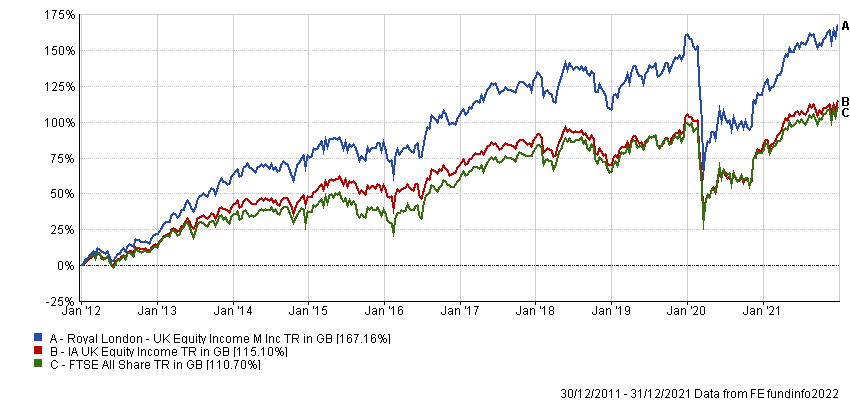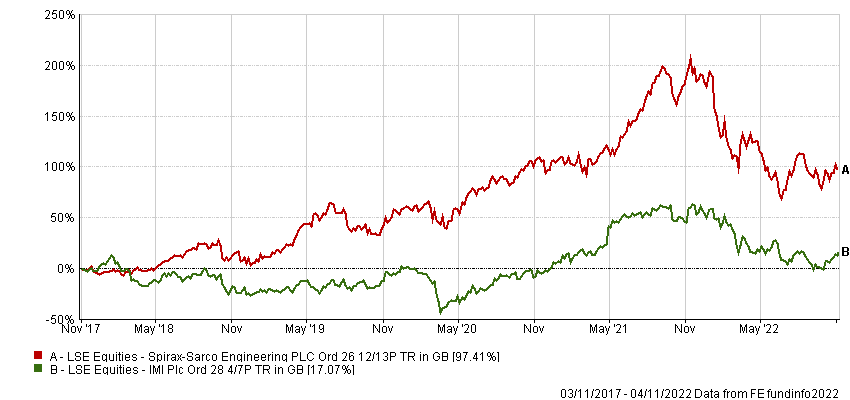Royal London’s Richard Marwood has claimed he would gladly accept finishing in the 45th percentile of his sector in every month for the rest of his career, pointing out that delivering small but regular gains is the best way to deliver significant outperformance over the long term.
Marwood’s Royal London UK Equity Income fund has beaten its IA UK Equity Income sector in eight of the past 10 calendar years. The fund has never been in the top decile of its sector in any one of these periods and only made the second decile in three, but the cumulative effect of the consistent outperformance has meant it has beaten its peer group average by more than 50 percentage points over the decade in question.
Performance of fund vs sector and index over 10yrs

Source: FE Analytics
Although much of the performance came under former manager Martin Cholwill, who retired last year, Marwood hopes to run the fund in the same way, meaning it is unlikely to ‘shoot the lights out’ in the short term.
“If you want to be the absolute top fund over any short-term period, you have to take a style bet and I try and avoid those,” he explained.
“What I like to do is get the stockpicking right, and if you can regularly get a little bit ahead of the market and a little bit ahead of your peers, that compounds up over time.
“I know it sounds boring, but if you said to me ‘you're going to be 45th percentile in your peer group every single month from now until the very end of your career’, I would take that, because as you compound that up month on month, you find that your 10-year numbers are fantastic.”
Marwood said one principle that is vital for generating consistent outperformance is separating the public perception of a company from the hard reality of its business operations, including the cashflows it generates and the strength of its balance sheet.
As an example, he pointed to Spirax Sarco, a manufacturer of steam management systems and pumps. While the manager said it is still a great business, he pointed out it had risen to an extreme valuation after the market placed a premium on growth stocks. He contrasted its fortunes with that of another engineering company, IMI.
“Despite growing quite well, generating cash and not being heavily geared, it trades on quite a low multiple,” he explained.
“At the moment, people are looking at a lot of cyclical businesses and thinking there are going to be very large earnings downgrades to come, but we haven't seen them yet.”
Performance of stocks over 5yrs

Source: FE Analytics
Another example away from the engineering sector is furnishings retailer Dunelm.
“We can see that the consumer has been squeezed,” Marwood continued. “But at the same time, it’s just taken more and more market share over the past few years as retailers such as department stores have left the market, while a lot of the small independents couldn’t compete.
“And I think that's what will happen this time around. You'll see more competitors going out of business, and Dunelm will take market share. That's another area where the perception and the top-down doesn't necessarily marry up with the bottom-up strength of the business.”
Despite the fact Marwood is less concerned with a business’s potential than its operational performance and how much of this is reflected in its share price, he denied this made him a value investor.
He accepted that because income investors tend to operate in more mature areas of the market, there is always the risk they end up in companies that are in long-term decline. But he said that a company isn’t necessarily a bad investment if it operates in a shrinking industry, so long as it deploys capital efficiently, which often means returning cash to shareholders
“I try and have some businesses which are very mature and throw off lots of cash, but then some which are in the earlier stages of their lifecycle: still generating cash, still paying dividends, but not at such a mature stage as others. It's part of balancing risk,” he said.
“That a business generates cash is just the starting point – it’s what it does with it after that that is important.”





